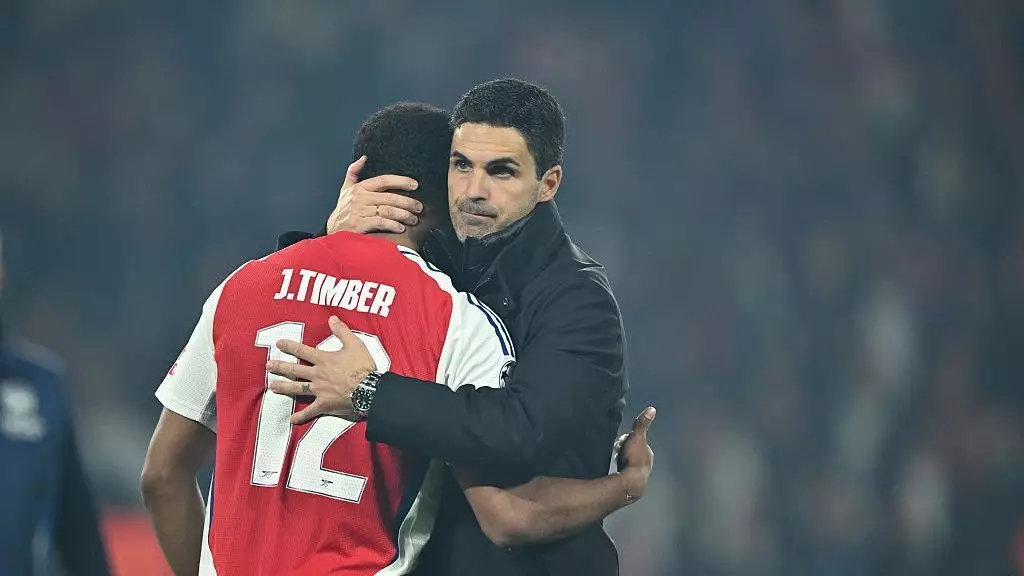In the wake of Arsenal’s dramatic exit from the Champions League semifinals, the feelings of frustration and heartbreak loom large over the club and its supporters. Despite the fervent belief of manager Mikel Arteta that his team was the better side, they fell to Paris Saint-Germain (PSG), who emerged victorious with a 2-1 win in the second leg, securing a 3-1 aggregate advance. Arteta’s unwavering confidence in his squad paints a picture of a frustrated genius: a manager whose vision is clear yet continuously thwarted by the harsh realities of knockout football.
Arsenal showed spark early on, pushing hard against PSG and threatening their defense. With brilliant saves from PSG goalkeeper Gianluigi Donnarumma—who almost seemed to be a wall of resistance—Arsenal’s best efforts were squashed time and again. This outcome echoed a theme prevalent in the narrative of their last few seasons: a promising start with little to show for it. Was there a turning point they could have grasped? A missed opportunity or a crucial decision that could have altered the course of the game? These questions will linger as supporters reflect on what may have been.
The Dichotomy of Praise and Disappointment
Arteta’s declaration that “the best team lost” embodies the complex emotions of a manager who balances pride with disappointment. It’s not uncommon for passionate coaches to sulk in disbelief when referees or the fates of football dictate outcomes. However, the critique from rival coach Luis Enrique presents an interesting angle: it’s not merely about who plays better; it’s about who scores. Despite the emotional fallout, the harsh lesson remains clear—results matter more than performances.
This juxtaposition of sentiment from Arteta and Enrique sheds light on the multifaceted nature of competitive sports. While Arteta sees flashes of brilliance and potential in his squad, Enrique emphasizes the fundamental truth of the sport: at the end of the day, the team with the most goals advances. Such sentiments are a reminder to Arsenal players that their fine performances must translate into tangible success.
Chances and Missed Opportunities
Midfielder Declan Rice expressed how critical early opportunities could have changed the tide. A goal within the game’s first moments could have given their side not only the lead but also invaluable momentum. Yet, it’s quintessentially Arsenal to miss these chances. This has been a narrative thread woven throughout their recent campaigns, where they’ve faced disheartening setbacks despite creating multiple opportunities to take control.
Against PSG, it was more than just a game of football; it was a test of character. Failing to capitalize on clear chances and then conceding goals from errors laid bare the reality of high-stakes games. The missed chances served as painful reminders of how quickly fortunes can shift in elite football, and they also expose the fragile psychology that can grip even the strongest of teams when faced with adversity.
The Path Forward
With this latest loss marking a significant moment in Arsenal’s quest for silverware, the club now faces the daunting prospect of a fifth consecutive season without a major trophy. Amidst the agony lies the potential for growth—both individually and collectively. This critical juncture challenges the players and coaching staff to reassess and emerge stronger. As Rice expressed, resilience can grow from losses; learning to harness pain and utilize it as motivation could fortify their spirit for the challenges ahead.
Each setback acts as a crucible for forming a stronger identity, and for Arsenal, this reality is no different. The lessons evident in these painful matches are key to evolving the current squad into one capable of overcoming the hurdles that seem to perpetually block their path to glory.
Frequently the difference between triumph and failure is minimal; it’s about improving the finer details that can turn a valiant effort into a victorious outcome. Arsenal must now channel the rage of this defeat into a relentless pursuit of greatness, armed with the knowledge that sometimes, heartbreak is merely the precursor to future triumphs.

